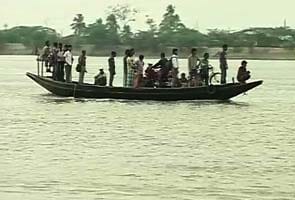A trip to a part of Bengal where humans are bought and sold everyday
Daily Routine for Knees – Doctors reveal the secret to better knees & joints - Do this daily!

In a reply to a Lok Sabha question on missing people last month, the Minister of State for Home Affairs shared some shocking data from across the country. In the last one year, 14,000 adults and children have disappeared from West Bengal. Most of them are believed to have been swallowed up by the huge trafficking trade that is accustomed to treating West Bengal as its catchment area.
The statistics shared by the government: More than 8000 girls have disappeared, another 5500 males have also been reported missing by their families.
Buyers refer to villages like Sandeshkhali as "a source area." In the last 10 years, virtually every household has a mother waiting for a daughter to return. Sandeshkhali was devastated by cyclone Aila in 2009. The natural disasters in this area have left it ravaged physically and emotionally. The region has been drenched in poverty for years. That makes it vulnerable to any offer that promises money, even if it entails sending young children to far away cities.
A mother talks to us about her 16-year-old daughter who left home six years ago when she was promised a job in Hyderabad. The family was told by the middlemen who collected the teen that a part of her salary would be sent home every month. They have never heard from their daughter after that. "They took her for a year but Durga Puja came, Kali Puja came... year after year passed but she never returned," says the woman in a small thatched house. She has four children including two girls at home with her still. Their monthly income is Rs.1000 - an amount that means when the next buyer arrives, it may not be possible to turn him down.
Remote villages like this one have an established kingpin - in this case, a man named Hari - who serves as the middleman between families here and those in cities who will sell the women into prostitution or to agencies that supply domestic help. When confronted, Hari threatened us and tried to take our camera away. Hari sells the girls to the nearest town. From there, they are traded several times over before they arrive in big cities. Those who are not sold to brothels end up with employment agencies who supply domestic help to homes in Delhi. Many agencies ensure they collect the salaries from employers, ensuring that the help receives no money. Without any resources in a strange and large city, there are few ways to return home or seek help for a better living.
The Ministry of Home Affairs has directed state governments to set up special Anti-Human Trafficking Units (AHTUs) in every district. In West Bengal this initiative was meant to begin three years ago. Each unit is supposed to have a minimum of five persons equipped with camera, cellphones and a vehicle. The need for these cells was felt after a report by the National Human Rights Commission which said in 2006 that nearly 45,000 children go missing every year in India.



No comments:
Post a Comment